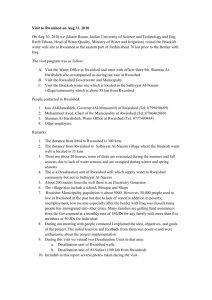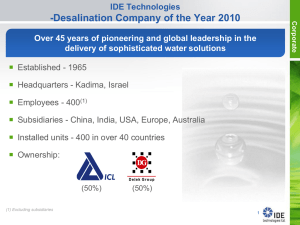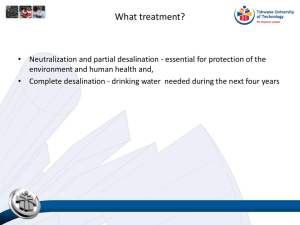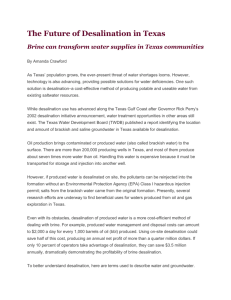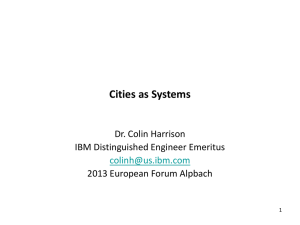Paper
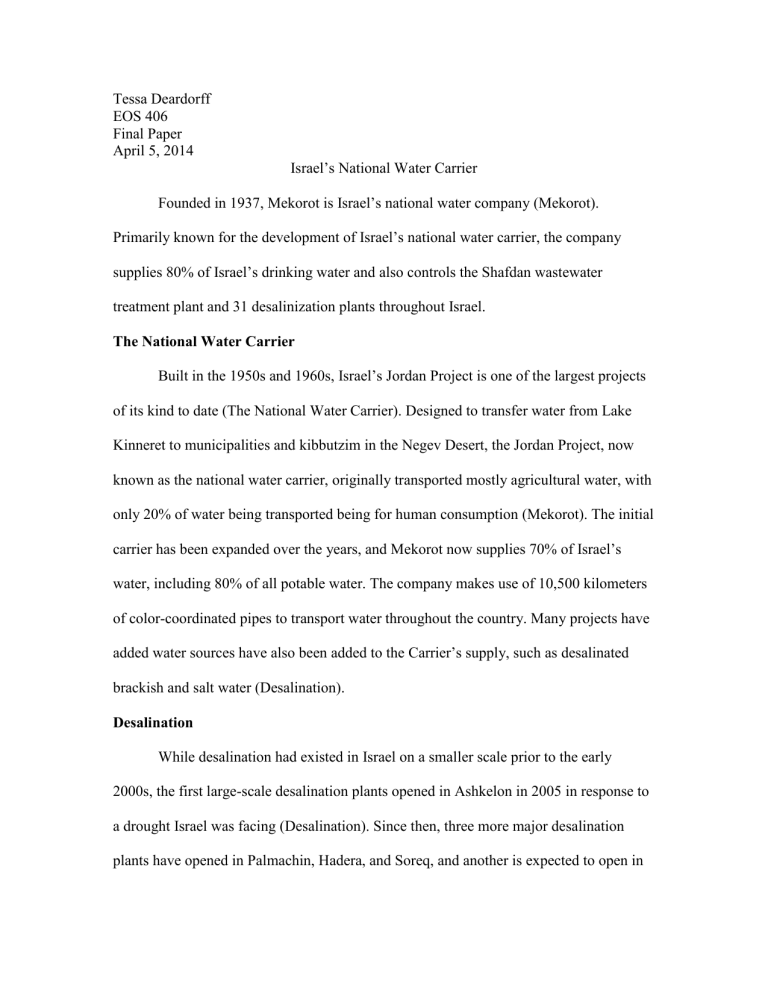
Tessa Deardorff
EOS 406
Final Paper
April 5, 2014
Israel’s National Water Carrier
Founded in 1937, Mekorot is Israel’s national water company (Mekorot).
Primarily known for the development of Israel’s national water carrier, the company supplies 80% of Israel’s drinking water and also controls the Shafdan wastewater treatment plant and 31 desalinization plants throughout Israel.
The National Water Carrier
Built in the 1950s and 1960s, Israel’s Jordan Project is one of the largest projects of its kind to date (The National Water Carrier). Designed to transfer water from Lake
Kinneret to municipalities and kibbutzim in the Negev Desert, the Jordan Project, now known as the national water carrier, originally transported mostly agricultural water, with only 20% of water being transported being for human consumption (Mekorot). The initial carrier has been expanded over the years, and Mekorot now supplies 70% of Israel’s water, including 80% of all potable water. The company makes use of 10,500 kilometers of color-coordinated pipes to transport water throughout the country. Many projects have added water sources have also been added to the Carrier’s supply, such as desalinated brackish and salt water (Desalination).
Desalination
While desalination had existed in Israel on a smaller scale prior to the early
2000s, the first large-scale desalination plants opened in Ashkelon in 2005 in response to a drought Israel was facing (Desalination). Since then, three more major desalination plants have opened in Palmachin, Hadera, and Soreq, and another is expected to open in
Ashdod by the end of the year (Mekorot). Most Israeli desalination plants use a reverse osmosis system to remove salt from brackish groundwater or seawater, depending on their location (Desalination). Instead of heating the water and cooling its condensation like multi-stage flash systems do, reverse osmosis uses pressure to force the salted water through a spiraled filter (Vengosh). The salts in the brackish water cannot move through the filter, so only the freshwater pushes through, leaving behind brine that must be disposed. Reverse osmosis plants that contain twenty or so filters, like the one we saw at
Kibbutz Maggan, to thousands of filters, such as the Hadera plant. Hadera, the highest outputting desalination plant in Israel, is capable of producing over 120 million cubic meters of water a year (Hadera Project).
Desalination and Mekorot
While some kibbutzim use the water they produce in their plants, many have purchase agreements with Mekorot (Mekorot). According to the company’s website, the company purchases desalinated water from 31 plants throughout Israel, for a total of one million cubic meters of water a day. Of these plants, thirty plants desalinate brackish water, while the plant in Hadera is the only one that desalinated seawater. Some of these plants, like the four major plants listed in the previous section, are operated under buildoperate-transfer agreements, where Mekorot gives a private company the money to build a plant and operate the company under a contract with Mekorot (Ashkelon Desalination
Plant). In the case of the new Ashdod plant, Mekorot will spend $200 million on the project and will hold ownership of the plant until 2027 (Water From The Sea). Thus, desalinated water accounts for about 24% of Mekorot’s supply (Mekorot). These agreements typically state that the plant will provide X number of gallons of water to
Mekorot at the price of Y NIS per cubic meter. The current going rate for a cubic meter of desalinated water is about 2.6 NIS, or 75 American cents (Ashkelon-Water
Technology).
A major goal for desalination researchers is to reduce the cost of production so that the cost of desalinated water may be lower; however, reverse osmosis is already has significantly lower multi-stage flash systems do (Vengosh). In addition to attempting to make the process more cost-efficient, Mekorot has a team of researchers devoted to learning how to desalinate the brine that is left over from the initial desalination process
(Mekorot). There are plans in the works to increase the desalinated water supply sevenfold, and to produce over 200 million cubic meters of desalinated water a year.
Conclusion
Overall, the introduction of desalinated water to the National Water Carrier has significantly increased the amount of available drinking water to Israelis (Mekorot).
Because desalination plants are able to make drinking water out of brackish groundwater and seawater, two sources that were previously unusable by the general public, Mekorot can pull less water from Lake Kinneret and other natural freshwater sources in Israel.
However, there are a few costs associated with Mekorot purchasing desalinated water.
First off, the company has the rights to pump water from Lake Kinneret, while desalinated water costs the company money to purchase. However, the benefits of desalination out way the costs (Water From the Sea). While there are misconceptions about the financial costs of building desalination plants, the plants are also good for the local economy. They give construction workers jobs, and the plants need to hire workers and technicians. Another issue is the health risks associated with desalinated water. Much
of the water that comes out of desalination plants may contain contaminants that the reverse osmosis system cannot remove and the water may be too salty for human consumption, so Mekorot must enforce quality control operations to ensure the safety and quality of the water (Vengosh).
Despite these issues, desalination is a great option for countries like Israel that are at risk for droughts and have large amounts of salted water. In the future, Mekorot might be able to further cut back its dependency on freshwater supplies and make more use of its brackish and seawater reserves.
Works Cited
"Ashkelon Desalination Plant - A Successful Challenge." Ashkelon Desalination Plant -
A Successful Challenge . Web. 22 Apr. 2014.
"Ashkelon-Water Technology." Ashkelon . Web. 22 Apr. 2014.
Desalination-Mekorot . Powerpoint.
"Hadera Project - IDE Technologies." IDE Technologies . Web. 22 Apr. 2014.
"Mekorot, Israel's National Water Company." Mekorot, Israel's National Water
Company . Web. 21 Apr. 2014.
"Mekorot to Build 5th Desalination Plant, but Spat over Price Goes on." Haaretz.com
.
Web. 21 Apr. 2014.
"The National Water Carrier (Ha'Movil Ha'Artsi)" The National Water Carrier(Ha'Movil
Ha'Artsi) Web. 22 Apr. 2014.
Vengosh, Avner. Global Hydrology Powerpoint
"Water Context 12/12." Water Context 12/12 . Web. 21 Apr. 2014.
"Water From The Sea: The Risks And Rewards Of Israel's Huge Bet On Desalination."
International Business Times . Web. 21 Apr. 2014.

